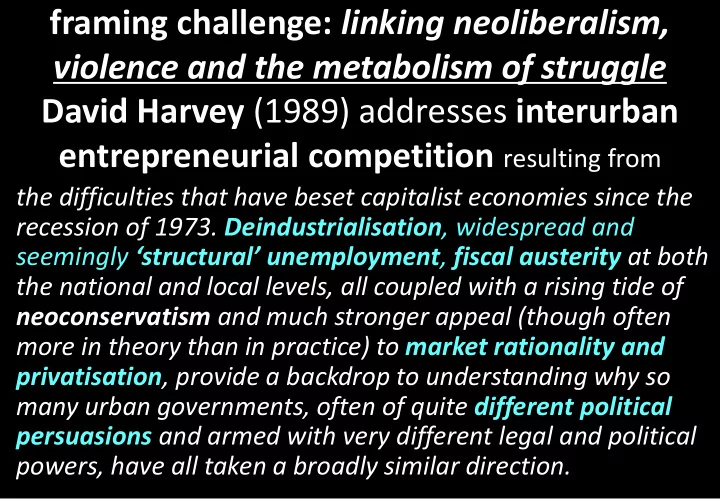

framing challenge: linking neoliberalism, violence and the metabolism of struggle David Harvey (1989) addresses interurban entrepreneurial competition resulting from the difficulties that have beset capitalist economies since the recession of 1973. Deindustrialisation , widespread and seemingly ‘structural’ unemployment , fiscal austerity at both the national and local levels, all coupled with a rising tide of neoconservatism and much stronger appeal (though often more in theory than in practice) to market rationality and privatisation , provide a backdrop to understanding why so many urban governments, often of quite different political persuasions and armed with very different legal and political powers, have all taken a broadly similar direction.
Harvey (1989) on interurban entrepreneurial competition to the degree that interurban competition becomes more potent, it will almost certainly operate as an ‘external coercive power’ over individual cities to bring them closer into line with the discipline and logic of capitalist development . It may even force repetitive and serial reproduction of certain patterns of development (such as the serial reproduction of ‘world trade centers’ or of new cultural and entertainment centers, of waterfront development , of postmodern shopping malls, and the like).
Racial self-identification in Durban in 2001
Income self-identification in Durban in 2011
Njabulo Dube, Thuli Ndlovu “John - John” Ntuli killed at home and Ntobeko in KwaNdengezi Maphumulo of in October Numsa in August 2014. 2014. Malizo Fakaza and Inkosi Mbongeleni Nhlanhla Mkhize in Zondi , grandson of Reservoir Hills, in Bhambatha Zondi, was October 2013. killed in Umlazi in January 2009. in New Germany, local SANCO leader Jimmy Mtolo was killed in February 2009. Thembinkosi Qumbelo and Ahmed Osman gunned Nkululeko Gwala down on his stoop in 2009 were assassinated in Clairwood ; SDCEA’s Des and Nqobile Nzuza D’Sa nearly killed in a killed by police bullet firebombing of his flat in in Cato Crest, March- 2008; ward councilor and September 2013 . former SDCEA member Rajah Naidoo in 2007
• Thuli Ndlovu was killed at home in KwaNdengezi in October 2014. • Njabulo Dube, Sibonelo “John - John” Ntuli and Ntobeko Maphumulo were Numsa shopstewards killed after attending a Durban meeting in August 2014. • Malizo Fakaza and Nhlanhla Mkhize were killed while opposing electricity disconnections in Reservoir Hills, in October 2013. • Thembinkosi Qumbelo and Nkululeko Gwala were assassinated and Nqobile Nzuza was killed by stray police bullet in Cato Crest from March-September 2013. • Inkosi Mbongeleni Zondi , grandson of Bhambatha Zondi, was killed in Umlazi in January 2009. • A month later in the suburb of New Germany, the local leader of the South African National Civic Organization, Jimmy Mtolo , was shot on a Saturday morning by an assassin who came into his office ostensibly seeking help with housing. • A few weeks later, in April 2009, South Durban Community Environmental Alliance (SDCEA) leader Ahmed Osman was gunned down on his stoop in cold blood on a warm late-summer evening, in the midst of fighting companies responsible for toxic waste releases in Clairwood. • In 2008 , SDCEA’s Des D’Sa was nearly killed in a firebombing of his flat. In 2007, ward councilor and former SDCEA member Rajah Naidoo was the victim of a similar hit. • In August 2008, demonstrations in the center of town in front of the ICC led to the death of 22-year- old University of South Africa political science student Mthoko Nkwanyana , who was protesting high tuition fees alongside 400 others; police used tear gas so aggressively that he died. • This was reminiscent of a similar protest at UKZN’s Westville campus in 2001 when Michael Makhabane was killed by security guards during a peaceful protest of more than 500 students, again against high fees. • Another youth, Marcel King , was killed in June 2004 in Phoenix township, not far from Gandhi’s settlement, shot between the eyes by security guards hired by the Durban municipality to disconnect illegal electricity hookups. • In July 2007, civil society activist Sajida Khan died because Durban municipal toxins, floating across Clare Road from Bisasar Road dump, gave her two bouts of cancer.
who’s breeding the white elephants? • Johan van Zyl , Toyota SA CEO: ‘Durban as a brand is not strong enough to simply say “come and invest in Durban”. What it needs to attract investors are big projects. Durban needs to keep ahead of the competition. China is building ports they don’t even know when they will use. If return on investment is the line of thinking we may never see the infrastructure.’ – 6 February 2012
who wins from infrastructure spending? Peter Bruce, editor of Business Day: ‘mine more and • faster and ship what we mine cheaper and faster ’ – February 13 2012 • Minister of Economic Development Ebrahim Patel: ‘We took account of the lessons of the 2010 World Cup infrastructure and the growing experience in the build programmes for the Gautrain, the Medupi and Kusile power stations, the Freeway improvement programme and the major airport revamps.’ – Feb 2012
Island View in an already freight tank farm traffic hypertoxic (often illegal) South Durban, Africa’s container biggest port ‘Africa’s armpit’ terminals hazardous petro- chemical plants new capacity: R250 billion plan! Mondi Engen: 80% paper mill Petronas Africa’s largest oil (Malaysia) refining complex Toyota car Sapref: single buoy assembly BP/Shell mooring: 80% of SA’s intake
what other damage?
community /environmental opposition
in meeting after meeting: unanimous opposition to port-petrochem expansion
will state/capital’s incremental strategy plus community co-optation work?
activists envisage 5-step ‘South Durban Detox’ resist, rezone, restructure 1) reverse attempted rezoning of Clairwood 2) enforce/expand existing residential zoning of Clairwood, Merebank and Wentworth 3) mobilise solidarity in Durban & everywhere 4) take seriously climate rhetoric: shift freight to trains, lower trade vulnerability, de-smokestack 5) plan/implement post-pollution, post-carbon Durban with ‘Million Climate Jobs’ campaign
Recommend
More recommend